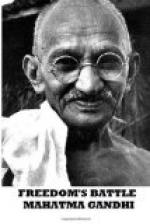I admit as I have already done that non-co-operation is not unattended with risk, but the risk of supineness in the face of a grave issue is infinitely greater than the danger of violence ensuing form organizing non-co-operation. To do nothing is to invite violence for a certainty.
It is easy enough to pass resolutions or write articles condemning non-co-operation. But it is no easy task to restrain the fury of a people incensed by a deep sense of wrong. I urge those who talk or work against non-co-operation to descend from their chairs and go down to the people, learn their feelings and write, if they have the heart against non-co-operation. They will find, as I have found that the only way to avoid violence is to enable them to give such expression to their feelings as to compel redress. I have found nothing save non-co-operation. It is logical and harmless. It is the inherent right of a subject to refuse to assist a Government that will not listen to him.
Non-co-operation as a voluntary movement can only succeed, if the feeling is genuine and strong enough to make people suffer to the utmost. If the religious sentiment of the Mahomedans is deeply hurt and if the Hindus entertain neighbourly regard towards their Muslim brethren, they will both count no cost too great for achieving the end. Non-co-operation will not only be an effective remedy but will also be an effective test of the sincerity of the Muslim claim and the Hindu profession of friendship.
There is however one formidable argument urged by friends against my joining the Khilafat movement. They say that it ill-becomes me, a friend of the English and an admirer of the British constitution, to join hands with those who are to-day filled with nothing but ill-will against the English. I am sorry to have to confess that the ordinary Mahomedan entertains to-day no affection for Englishmen. He considers, not without some cause, that they have not played the game. But if I am friendly towards Englishmen,




